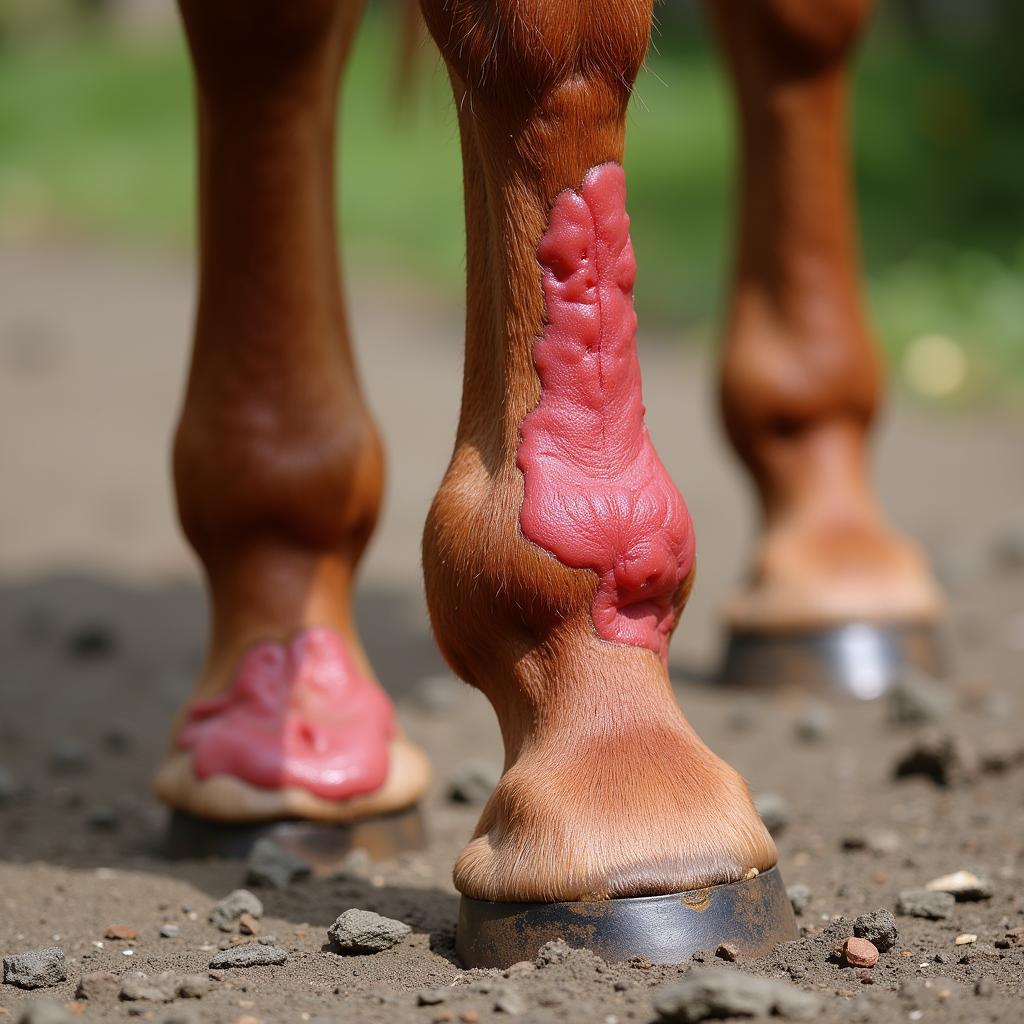Finding the best anti-inflammatory for horses requires careful consideration of the horse’s specific needs, the cause of inflammation, and potential side effects. This article will delve into the various options available, helping you make informed decisions about your horse’s health and well-being.
Understanding Equine Inflammation and the Need for the Best Anti-Inflammatory
Inflammation in horses is a natural response to injury or infection, characterized by pain, swelling, heat, and redness. While it plays a crucial role in healing, excessive or prolonged inflammation can be detrimental, hindering performance and causing discomfort. This is where the best anti-inflammatory for horses becomes essential. From osteoarthritis to soft tissue injuries, finding the right medication can make a significant difference in your horse’s recovery and quality of life.
 Horse Leg Showing Signs of Inflammation
Horse Leg Showing Signs of Inflammation
Types of Anti-inflammatories for Horses: Choosing the Best Option
Several types of anti-inflammatories are available for horses, each with its own benefits and drawbacks. Non-steroidal anti-inflammatory drugs (NSAIDs) are commonly used to manage pain and inflammation associated with musculoskeletal conditions. These include phenylbutazone (“bute”), flunixin meglumine (Banamine), and firocoxib (Equicox). While highly effective, NSAIDs can have potential side effects, particularly with long-term use. Therefore, it’s crucial to consult your veterinarian to determine the appropriate dosage and duration of treatment.
Another category of anti-inflammatories includes corticosteroids, such as dexamethasone and prednisolone. These are potent drugs typically reserved for more severe inflammatory conditions. Corticosteroids have a broader range of side effects and require careful monitoring by a veterinarian. Herbal supplements for horses can also play a role in managing inflammation naturally. While they may not be as potent as traditional medications, they can offer a gentler approach with fewer side effects. You can learn more about specific dosage information on our page dedicated to dexamethasone for horses dosage.
What is the Best Anti-inflammatory for Horses with Osteoarthritis?
Osteoarthritis is a common degenerative joint disease in horses, causing pain and stiffness. Choosing the best anti-inflammatory for horses with osteoarthritis depends on the severity of the condition and the individual horse’s response to treatment. NSAIDs like firocoxib are often preferred for long-term management due to their relatively lower risk of gastrointestinal side effects. In some cases, joint injections containing corticosteroids or hyaluronic acid may be recommended to provide localized relief. Supportive therapies, such as osteo form for horses, can also be beneficial in managing osteoarthritis and improving joint health.
When to Call the Vet: Recognizing Signs and Seeking Professional Advice
While some mild inflammation can be managed with rest and conservative care, it’s essential to recognize when professional veterinary intervention is necessary. Signs such as persistent lameness, severe swelling, or loss of appetite should prompt a call to your veterinarian. They can diagnose the underlying cause of inflammation and recommend the best course of treatment, which might include prescription medications, therapeutic modalities, or even surgery. Don’t hesitate to seek advice; early intervention is often key to a successful outcome.
 Veterinarian Examining a Horse
Veterinarian Examining a Horse
Conclusion: Prioritizing Your Horse’s Health and Well-being with the Best Anti-Inflammatory
Choosing the best anti-inflammatory for horses involves a multifaceted approach, considering the underlying cause of inflammation, the specific medication’s benefits and risks, and the individual horse’s needs. Always consult your veterinarian for an accurate diagnosis and personalized treatment plan. Prioritizing your horse’s health and well-being through informed decision-making will ensure they remain comfortable, healthy, and able to perform at their best. You might also be interested in exploring herbal supplements for horses and cough medicine for horses for additional support. If you’re looking to improve gut health, consider exploring the benefits of butyric acid supplement for horses.
FAQ
- What are the common signs of inflammation in horses?
- What are the different types of anti-inflammatories available for horses?
- What are the potential side effects of NSAIDs in horses?
- When should I call the vet for inflammation in my horse?
- What are some natural ways to manage inflammation in horses?
- How can I prevent inflammation in my horse?
- What is the best way to administer anti-inflammatories to my horse?
For further assistance, contact us: Phone: 0772127271, Email: [email protected], Address: QGM2+WX2, Vị Trung, Vị Thuỷ, Hậu Giang, Việt Nam. We have a 24/7 customer service team.